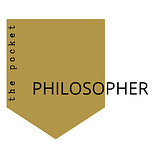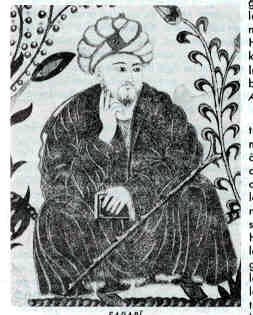Thought
He [Al-Farabi] paid special attention to the study of language and its relation to logic. In his numerous commentaries on Aristotle's logical works he expounded for the first time in Arabic the entire range of the scientific and nonscientific forms of argument and established the place of logic as the indispensable prerequisite for philosophic inquiry. 1
Application
If you remember a few weeks ago, we briefly covered the struggle that philosophy (particularly the work of early Greek thinkers like Plato and Aristotle) had in surviving through the Dark Ages of European history.
What many don’t realize, is that during this time a special care had already been taken by philosophers in places like Iraq, Persia, and Syria to preserve European thought and meld it with classical Islamic philosophy. Not only were they doing philosophy that was important in its own right, they were also caring for the work of their European neighbors.
The result: when the European Dark Ages had concluded, these scholars were able to share with them the boon of their work preventing its loss for the remainder of history.
In Western settings its rare to hear about scholarship in the Arab world—however, it’s a rich tradition that continues to this day.
Of these ancient scholars, one in particular stands out in the way he worked to preserve Greek philosophy of language and logic.
Abu Nasr Al-Farabi spent much of his professional life studying the works of Aristotle, translating them into Arabic, and working them into the larger framework of Muslim scholarship.
Excitingly, much of this work was actually a joint project done by Al-Farabi, his mentor, and a few of their Arab Christian counterparts. This type of alliance demonstrates the kinship that philosophy created when sectarianism could have developed just as easy.
The result of this work was mountains of careful scholarship done by precise students seeking to know the meaning and thought of Aristotle and other Greek thinkers. They not only translated, but also challenged, fused, incorporated, and critiqued the work making invaluable contributions to the Great Conversation.
In many respects, their discoveries paralleled those other linguists we’ve studied—that language was innate, that personal truth was found in this innate language, and that logical thought was based on the understanding, study, and careful formation of this innate language. Then and only then, can we have a hope of understanding each other’s meaning.
Yet again, it’s in the study of language that we encounter the importance of humility in the face of public discourse. Perhaps it was this very precept that enabled people of such diverse groups to collaborate in the name of wisdom and preservation.
We’re building a community of people committed to increasing our empathy and compassion through the study of timeless wisdom from around the world. Click here to join!
Backstory
Little is known about the early life of Al-farabi, though many scholars have developed theories that place him growing up in either Turkey, Persia, or Iraq.
What is clear, is that he spent much of his professional life in Baghdad and Damascus, doing incredible work with Muslim and Christian scholars alike.
I found this reality the most exciting, to find such examples of non-sectarian collaboration. I compare this to the modern landscape where tensions between denominations even within the same faith tradition isn’t uncommon.
To achieve some harmony and cooperation in any age is a miracle. But it appears that it was a common love of wisdom and scholarship that united such a diverse group of people into mutual cooperation and study.
Aside from Al-Farabi, scholars like Avicennan and Ghazâlî's equally contributed to the Great Conversation. Avicennan took critique of Greek thought even further than his predecessor Al-Farabi in some really sophisticated works. If you are at all interested in Islamic philosophy, these are great places to dig in further.
I’m excited to continue in my personal study of Muslim philosophers and other traditions that are not my own. In that vein, if you have ideas for traditions, philosophers, or thinkers that you would like to see represented in our newsletter, please reply to this email with a short explanation so we can consider for a future edition!
I’m looking forward to our Weekly Rundown tomorrow, as well as announcing some exciting news coming up next week!
Until then, have a great rest of the day,
-TPP
Know someone who would find this interesting? Share here!
References:
https://www.ejournals.eu/pliki/art/6216/
https://plato.stanford.edu/entries/arabic-islamic-language/#AviTraMadBey
https://plato.stanford.edu/entries/al-farabi/#:~:text=Ab%C3%BB%20Nasr%20al%2DF%C3%A2r%C3%A2b%C3%AE%20was,951%20CE%20(AH%20339).
https://en.wikipedia.org/wiki/Al-Farabi
https://academiaanalitica.files.wordpress.com/2019/07/shukri-abed-aristotelian-logic-and-the-arabic-language-in-alfarabi.pdf
. Muhsin Mahdi, "Islamic Philosophy: The Eastern and Western Schools," in Islam: The Perenniality of Values. Special issue of Cultures, vol. 4, no. 1 (1977), p. 41.












